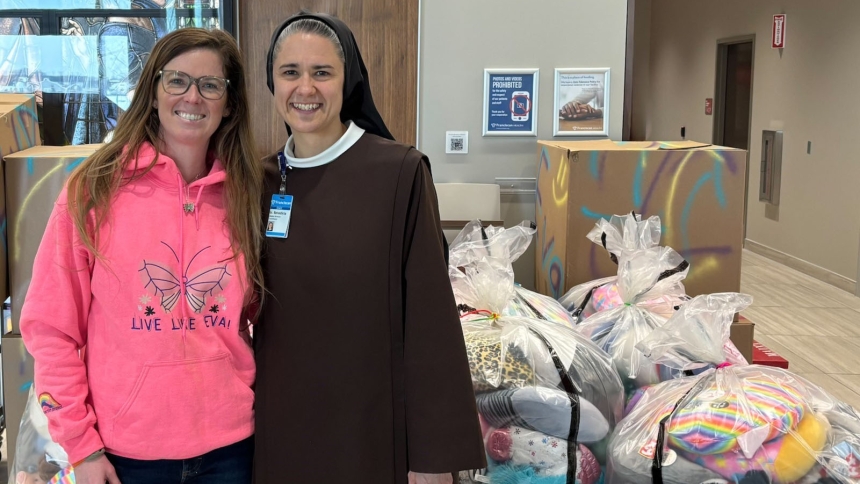
(Nota: para la traducción en español, ver abajo)
All of us can help foster a culture of Christian vocation in our young people
These past two weeks, I had the supreme joy to ordain two new priests for the diocese of Gary—Jordan Fetcko here in our Cathedral and Roque Meraz at Blessed Trinity Parish in Toronto, Canada. In my service as an auxiliary bishop, I had only ordained deacons, so these two ordinations were a privilege and blessing to me. The faith, love and joy of the whole Catholic community surrounding these celebrations spoke to the goodness of these two men, but also proclaimed how much the People of God support, pray for and love their priests and want more of them!
I have had many conversations with Father David Kime, our vocations director, regarding ways we can encourage our young people to discern a possible vocation to priesthood or religious life. In this current cultural moment, such a call may be increasingly difficult to hear. I commend Father Kime and our past vocations directors for the inspiration, hard work and passion they have poured into this challenging work.
The essential task that lies before us is to nourish a culture of vocation, where every Catholic young person deeply understands that God is calling them to a particular role, service and contribution within the Church and the world. By virtue of baptism, every single one of us is summoned to a life of radical holiness, an attitude of discipleship, a posture of service. Whether that be marriage or single life, priesthood, religious life, the diaconate or lay ministry, being a doctor, a teacher or a data specialist, the work we do, the relationships we embrace, the public commitments we make as Catholics will be an expression of our vocation, a living out of God’s will for us.
While we certainly need all vocations to flourish in greater numbers, I turn my attention in this column to the priesthood. A significant number of our pastors have served generously and well for many decades and are approaching retirement age. Many others have become senior priests after lives fully poured out in service to the People of God and they still continue to generously help out as they can. For all of these men, we are most grateful. Our Diocese could not function without them.
The future projection numbers for priests in our diocese, however, are sobering. The best scenario for 2020 is that we will have 52 priests below the age of 70 working in our parishes, schools and offices. I am 51 years old and there are only 15 priests in the Diocese younger than me.
I profoundly appreciate the contributions of our permanent deacons, lay ministers and volunteers. Their vocation is not secondary, is not simply a pragmatic “we need to help out Father.” As the Mystical Body of Christ, the Church functions best when all the members are living out their respective parts of the Gospel mission in the integrity of their identity and purpose. But, we will always need priests to preach the Word of God, celebrate the sacraments and shepherd our people. Their role is indispensable in our sacramental Church and we need to do all we can to promote the priesthood to our young men.
All of us -parents, teachers, catechists, friends, priests, deacons and religious - can help foster a culture of Christian vocation for our young people in various ways. Our greatest and most effective witness is to live our own vocation in the Church with joy, generosity and zeal. Actions speak louder than words. We can foster the faith in the young through prayer, catechesis and friendship. We can speak about the beauty of a religious vocation and invite youth to consider such a possibility for themselves. Priests can tell their own vocation story from the pulpit or in religion classes. We can call out the gifts of the young people we know and say “You would make a great priest” or “Have you ever considered being a religious sister? It’s an amazing life.” The power of personal invitation is profound.
Surprisingly, many Catholic parents are not supportive today when their son or daughter is considering a vocation in the Church. Smaller families, the clergy sex abuse crisis, fears about loneliness or lack of fulfillment, other ambitious plans that parents have already made for their children, are all factors in this lack of enthusiasm. I would encourage parents to be genuinely open to the Holy Spirit, to the remarkable possibility that God may be calling your child to a life of service and love within the Church and not to obstruct such an important discernment. Your faith, support and prayer are absolutely critical if we hope to build a new generation of leaders in the Church.
My 26 years in the priesthood have been fulfilling and joyful beyond my wildest dreams. In the seminary, I always knew that the priesthood would be great, but it has been 1,000 times better than that! To stand with people in the most beautiful, sorrowful, joyful and important moments of life and to speak about what matters the most - God, Christ, salvation, mercy, forgiveness, the Gospel, how to live, eternity -is a grace and privilege. To baptize, absolve sins and confect the Eucharist are remarkable gifts and responsibilities. If I had 10 lives to live, I would embrace them all as a priest!
Congratulations and prayers to Fathers Fetcko and Meraz! Your great adventure in Christ has just begun.
+ Donald J. Hying
Todos podemos ayudar a fomentar una cultura de la vocación cristiana en nuestros jóvenes
Estas dos semanas pasadas, tuve el gozo supremo para ordenar a dos nuevos sacerdotes para la Diócesis de Gary — Jordan Fetcko aquí en nuestra catedral y Roque Meraz en la parroquia de Santísima Trinidad en Toronto, Canadá. En mi servicio como obispo auxiliar, había sólo ordenado a diáconos, así que estas dos ordenaciones eran un privilegio y una bendición para mí. ¡La fe, el amor y la alegría de la comunidad toda católica que rodean estos festejos hablaban a la bondad de estos dos hombres, pero también proclamaron cuanto el pueblo de Dios, ayuda, ora por y ama a sus sacerdotes y quiere mas de ellos!
He tenido muchas conversaciones con Padre David Kime, nuestro director de las vocaciones, sobre maneras en que podemos alentar a nuestros jóvenes a discernir una posible vocación al sacerdocio o vida religiosa. En este momento cultural actual, tal llamada puede ser cada vez más difícil para oír. Recomiendo a Padre Kime y nuestros directores pasados de vocaciones para la inspiración, trabajo duro y pasión ellos se vertieron en este difícil trabajo.
La tarea esencial para nosotros es nutrir una cultura de vocación, donde cada joven católico entiende profundamente que Dios está llamándoles a una función concreta, servicio y contribución dentro de la iglesia y el mundo. En virtud del bautismo, cada uno de nosotros es convocado a una vida de santidad radical, una actitud de discipulado, una postura de servicio. Ya sea matrimonio o soltería, sacerdocio, vida religiosa, el ministerio diaconal o laicos, ser un médico, un profesor o un especialista de datos, el trabajo que hacemos, las relaciones que abrazamos, los compromisos públicos que hacemos como los católicos serán una expresión de nuestra vocación, una vida fuera de la voluntad de Dios para nosotros.
Mientras que ciertamente necesitamos todas las vocaciones que florezcan en mayor número, entrego mi atención en esta columna al sacerdocio. Un número significativo de nuestros pastores ha servido generosamente y bien por muchas décadas y se acercan a la edad de jubilación. Muchos otros se han convertido en sacerdotes jubilados después de vida derramada completamente al servicio del pueblo de Dios y todavía siguen generosamente a ayudar como puedan. Para todos estos hombres, estamos muy agradecidos. Nuestra diócesis no podría funcionar sin ellos.
Sin embargo, las cifras de proyección de futuro para los sacerdotes en nuestra diócesis, son aleccionadoras. El mejor escenario para el año 2020 es que vamos a tener 52 sacerdotes por debajo de la edad de 70 años trabajando en parroquias, escuelas y oficinas. Tengo 51 años y sólo hay 15 sacerdotes de la diócesis más jóvenes que yo.
Profundamente agradeczo las contribuciones de nuestros diáconos permanentes, laicos ministros y voluntarios. Su vocación no es secundaria, no es simplemente un pragmático "tenemos que ayudar a un padre." Como el Cuerpo Místico de Cristo, la iglesia funciona mejor cuando todos los miembros viven hacia fuera sus partes respectivas de la misión del Evangelio en la integridad de su identidad y propósito. Pero siempre necesitaremos a los sacerdotes a predicar la palabra de Dios, celebrar los sacramentos y servir como pastor de nuestro pueblo. Su papel es imprescindible en nuestra iglesia sacramental y tenemos que hacer todo que es posible para promover el sacerdocio a nuestros jóvenes.
Todos nosotros - padres, profesores, catequistas, amigos, sacerdotes, diáconos y religiosos - podemos ayudar a fomentar una cultura de la vocación cristiana de nuestros jóvenes de diversas maneras. Nuestro testimonio más grande y más eficaz es vivir nuestra propia vocación en la iglesia con alegría, generosidad y celo. Las acciones hablan más ruidosamente que palabras. Podemos fomentar la fe en los jóvenes a través de la oración, la catequesis y la amistad. Podemos hablar de la belleza de una vocación religiosa e invitar a jóvenes a considerar esa posibilidad para ellos mismos. Sacerdotes pueden contar su propia historia de vocación desde el púlpito o en clases de religión. Podemos llamar a los dones de los jóvenes que conocemos y decir "haría un gran sacerdote" o "¿has pensado en ser una hermana religiosa? Es una vida increíble". El poder de la invitación personal es profundo.
Sorprendentemente, muchos padres católicos no son apoyos hoy en día cuando su hijo o hija está considerando una vocación en la iglesia. Familias más pequeñas, el crisis del clero sexo abuso, temores acerca de la soledad o la falta de cumplimiento, otros ambiciosos planes que ya han hecho los padres para sus hijos, son todos factores en esta falta de entusiasmo. Animo a los padres a estar verdaderamente abiertos al Espíritu Santo, a la notable posibilidad de que Dios puede estar llamando a su hijo a una vida de servicio y amor dentro de la iglesia y no a obstruir un discernimiento tan importante. Su fe, apoyo y oración son absolutamente críticos si queremos construir una nueva generación de líderes en la iglesia.
Mis 26 años en el sacerdocio han sido plenos y alegres más allá de mis sueños. En el seminario, siempre supe que el sacerdocio sería genial, pero ha sido mil veces mejor que esto! Estar con la gente en el más hermosos, dolorosos, alegres e importantes momentos de la vida y hablar de lo que importa más - Dios, Cristo, salvación, misericordia, perdón, el Evangelio, cómo vivir, eternidad - es una gracia y un privilegio. Para bautizar, absolver los pecados y confeccionar la Eucaristía son notables dones y responsabilidades. ¡Si tuviera 10 vidas para vivir, les abrazaría todo como sacerdote!
¡Felicitaciones y oraciones a Padres Fetcko y Meraz! Acaba de comenzar su gran aventura en Cristo.
+ Donald J. Hying



